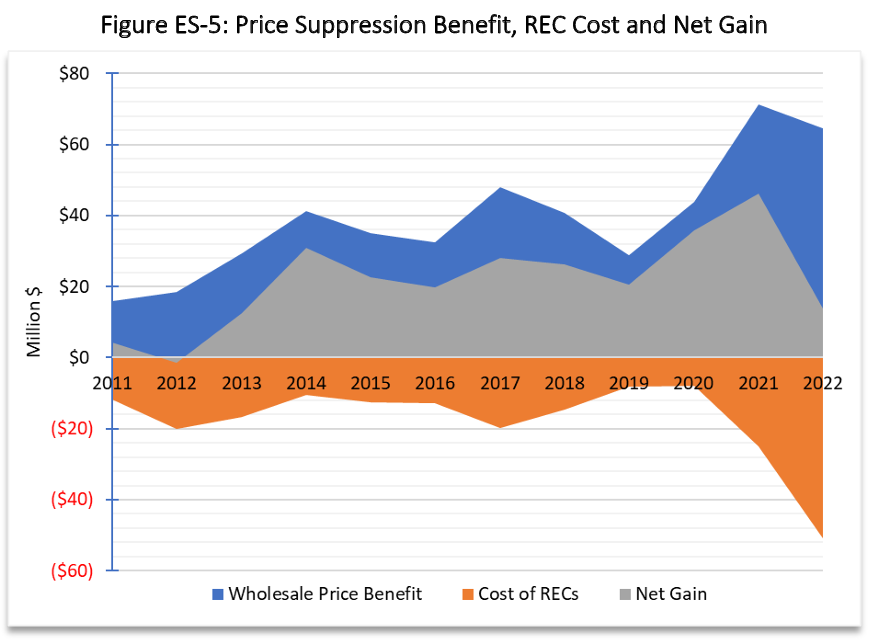Background
Maine’s Renewable Portfolio Standard (RPS), in place since 1999, establishes the minimum portion of electricity sold in Maine that must come from renewable sources such as wind, solar, hydro, and biomass, among others. In 2019, Governor Mills signed legislation that increased Maine’s RPS to 80 percent by 2030. In 2025, Governor Mills signed legislation increasing the RPS to 90 percent and establishing a new Clean Energy Standard (CES) to achieve 100 percent clean energy by 2040.
As of July 2025, 29 states and the District of Columbia have RPS policies, and 16 states have adopted 100 percent clean energy standards. Typically, a CES complements an existing RPS by recognizing a broader range of clean energy technologies to meet targets.

Renewable Energy Credits (RECs), or Renewable Energy Certificates, are tradable instruments that are used to track RPS compliance. Each time one megawatt-hour of renewable electricity is generated, a REC is issued and can be sold to electricity providers. To comply with Maine’s RPS, retail electricity suppliers must purchase RECs produced by generators that serve the New England region.
How do these policies impact energy prices?
Maine law requires the Governor’s Energy Office (GEO; now Maine Department of Energy Resources), in consultation with the Public Utilities Commission (PUC), to evaluate and report on the status and impacts of Maine’s RPS every three years. In 2024, GEO and the PUC retained a consultant to conduct the latest analysis of Maine’s RPS, published in March 2024. The report analyzes the costs, benefits, and economic impacts of Maine’s RPS, among other metrics. The full report is available to view here (PDF link).
Maine's RPS has helped to suppress electricity costs by expanding production of local renewable energy and reducing the state’s reliance on imported fossil fuels. Since 2011, Maine’s RPS is estimated to have saved ratepayers more than $21 million annually in electricity costs, driven more than $100 million in direct investment, and supported over 1,000 jobs. Maine’s new Clean Energy Standard is designed to build on the RPS, ensuring Maine has a diverse mix of affordable, clean energy resources to meet its goals, including large scale hydro and nuclear power.

RPS and CES policies can also:
- Lower overall energy costs across the economy
- Increase energy security by reducing reliance on imported fuels
- Improve resiliency by diversifying energy resources
- Encourage the development, financing, and construction of new energy resources, driving local job creation and economic development
- Maintain existing renewable energy resources
- Support related environmental, public health, and climate policy objectives
Policy Requirements & Eligible Technologies
In 2025, the passage of LD 1868 increased Maine’s RPS from 80 percent by 2030 to 90 percent by 2040 and added a complementary 10 percent CES to reach 100 percent clean energy by 2040.
Maine’s RPS: 90 percent of the electricity sold in the state will come from renewable sources by 2040
- 60 percent to come from new renewable resources (Class I/IA);
- 30 percent to come from existing renewable electricity generation (Class II).
Maine’s CES: 10 percent of the electricity sold in the state will come from clean resources by 2040 (Class III)
-
Phased increase of 1 percent per year, beginning in 2031, to reach a total of 10 percent by 2040.
The table below breaks down the eligible technologies and criteria for each policy. For more details and definitions, refer to M.R.S. 35-A § 3210.
Technology Classes
|
Class |
Eligible Technologies |
Eligibility Criteria |
|---|---|---|
|
Class I and IA |
Fuel cells, tidal, solar, wind, geothermal, hydroelectric, and biomass |
|
|
Class II |
Fuel cells, tidal, solar, wind, geothermal, hydroelectric, biomass, municipal solid waste, and efficient (cogeneration) |
|
|
Class III |
Class I/IA resources, hydroelectric, nuclear power plants, and any other source of electric generation that produces no more than a de minimis level of net GHG and co-pollutant emissions |
|
A separate portfolio requirement for the thermal sector is also established in law, requiring electricity suppliers to purchase Thermal Renewable Energy Credits from facilities that generate thermal energy (e.g. useful heat or steam, not electricity) from renewable sources such as biomass or sunlight.
Compliance
The Maine PUC monitors and ensures that electricity providers are in compliance with Maine’s RPS and has conducted competitive procurements to advance the policy. The PUC is also required to submit an annual RPS and CES compliance report to the Maine Legislature. As of 2023, 52 percent of the electricity sold in Maine was produced from renewable sources. For more information, please visit the PUC website. For more information on rulemaking, review the Maine PUC Rules and Laws & Chapter 311.

Energy Procurements
Energy procurements are complementary but separate policy mechanisms that can be used to advance state energy goals. RPS and CES policies set requirements for the portion of electricity that comes from renewable or clean sources, building market demand. Energy procurements involve competitive solicitations that award contracts to renewable or clean energy facilities, helping ensure adequate supply of renewable or clean energy to meet demand.